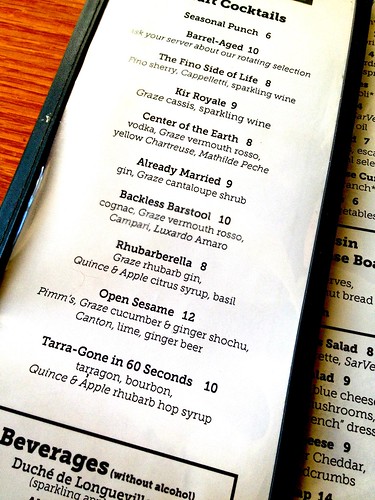Althouse |
- "Remember that copyright litigation between Marvin Gaye and the folks behind Blurred Lines?"
- Joe Biden emails: "Hold your breath, Ann."
- "Deeply... it's such a poser word."
- The NYT poll reports terrible numbers for Democrats, but calls the Republcian Party "deeply unpopular."
- "In the morning, it starts at home with champagne or red wine before 10am, then again champagne."
- Do school dress codes rules about covering body parts discriminate illegally against female students?
- Fried cheese curds.
- Martin Amis sets his novel in a Nazi concentration camp and his European publishers reject it.
| "Remember that copyright litigation between Marvin Gaye and the folks behind Blurred Lines?" Posted: 17 Sep 2014 11:40 AM PDT |
| Joe Biden emails: "Hold your breath, Ann." Posted: 17 Sep 2014 10:37 AM PDT Yes, it's just another email from democraticparty@democrats.org. Who knows who decides which Democrat's name to use to heighten the impression that I'm getting personal attention? But these creepy subject lines! "Hold your breath, Ann." And 2 days ago, I got one "from" Barack Obama with the subject line: "Almost out of time, Ann." And the thing is: It's meant to be scary. Not scary in the way these words seem most clearly to evoke, like someone is trying to kill me. But scary in the sense that I'm supposed to feel threatened by the possibility that Republicans will win in the fall elections. And by the way, where's the trigger alert? What if I — like many of the women pandered to by the Democrats' gender politics — was afraid of some stalker ex-boyfriend? Glancing at "Almost out of time, Ann" or "Hold your breath, Ann" in my inbox would horrify me. What the hell is wrong with these people? Where's the empathy? |
| "Deeply... it's such a poser word." Posted: 17 Sep 2014 10:24 AM PDT Said Meade, reading the previous post "The NYT poll reports terrible numbers for Democrats, but calls the Republcian Party 'deeply unpopular.'" It made me wish I'd had a tag on the word "deeply" all along. It's a metaphor, creating an image of abstract concepts in space. Where are you when you are "deeply in love"? There are so many trite usages — deeply in love, deeply disappointed, deeply religious, thinking deeply, deeply troubled, deeply concerned, deeply offended, deeply regret — and "deeply" is deeply embedded in constitutional law doctrine with the phrase "deeply rooted in this nation's history and tradition." But I'm interested in seeing how is "deeply" is deployed in various political and cultural statements, so I've searched this blog's archive, and here's the best of what I found: 1. "Beauty is a system of power, deeply rooted, preceding all others, richly rewarded," wrote Garace Franke-Ruta, explaining "Why Obama's 'Best-Looking Attorney General' Comment Was a Gaffe." 2. "During the period when [Althouse] rose to blogging prominence, conservatism as an ideology was deeply discredited and unpopular.... But if you look at her whole body of work, you can't escape the conclusion that she's deeply conservative." 3. Sarkozy said "I deeply enjoy the work" (of being President of France), and I said: "Wouldn't it be amusing if some day, a President resigned because he just wasn't enjoying the work — not deeply, anyway?" 4. Talking about libertarians, I said: "I am struck... by how deeply and seriously libertarians and conservatives believe in their ideas. I'm used to the way lefties and liberals take themselves seriously and how deeply they believe. Me, I find true believers strange and -- if they have power -- frightening. And my first reaction is to doubt that they really do truly believe." 5. Last May, Tina Brown said: "Now that Chelsea is pregnant, and life for Hillary can get so deeply familial and pleasant, she can have her glory-filled post-presidency now, without actually having to deal with the miseries of the office itself..." 6. This John Stuart Mill passage came up in the context of a discussion about free speech: "Society can and does execute its own mandates: and if it issues wrong mandates instead of right, or any mandates at all in things with which it ought not to meddle, it practices a social tyranny more formidable than many kinds of political oppression, since, though not usually upheld by such extreme penalties, it leaves fewer means of escape, penetrating much more deeply into the details of life, and enslaving the soul itself." 7. Something President Bush said in 2006: "It is deeply troubling that a country we helped liberate would hold a person to account because they chose a particular religion over another. I'm troubled when I hear, deeply troubled when I hear, the fact that a person who converted away from Islam may be held to account. That's not the universal application of the values that I talked about." 8. "Clinton's interest in global women's issues is deeply personal, a mission she adopted when her husband was in the White House after the stinging defeat of her health care policy forced her to take a lower profile." [SEE ALSO: the use of "deeply personal" to refer to Sonia Sotomayor's dissent in a case about affirmative action. I find it deeply interesting when a woman's interest in an important issue is called "deeply personal." I'm reminded of the old feminist slogan "The personal is political," which I'm inclined to jocosely reword: "The deeply personal is deeply political."] 9. Somebody called Dahlia Lithwick "deeply frivolous" for what she said about the Supreme Court case known as "Bong Hits 4 Jesus," and I said: "I mean, if I were stoned I might be fascinated by the phrase 'deeply frivolous,' but I don't think Carney meant to divert us into contemplating an oxymoron." 10. A sociologist said: "I live on puns and snide, sarcastic asides. I don't look too deeply into myself or anyone else... I drink a lot, take recreational drugs, don't care about much except being clever. I recently broke up with my girlfriend, and while I am eager to have sex, which I do often given the zillions of available women in New York, the sex is not especially fulfilling, and emotions rarely enter the picture. I am deeply shallow. And I know it." ADDED: 11. One of Hillary Clinton's most famous quotes: "This video is disgusting and reprehensible. It appears to have a deeply cynical purpose, to denigrate a great religion and to provoke rage." 12. A self-professed liberal says: "the liberal commitment to Roe has been deeply unhealthy — for American democracy, for liberalism, and even for the cause of abortion rights itself.... Roe puts liberals in the position of defending a lousy opinion that disenfranchised millions of conservatives on an issue about which they care deeply while freeing those conservatives from any obligation to articulate a responsible policy that might command majority support...." |
| Posted: 17 Sep 2014 07:01 AM PDT Check out all the numbers and consider the wording of the intro to the poll: A New York Times/CBS News poll shows that President Obama's approval ratings are similar to those of President George W. Bush in 2006 when Democrats swept both houses of Congress in the midterm elections.I'm thinking that the NYT loathes the GOP so much — the GOP is "deeply unpopular" at the NYT — that even when the poll numbers show the unpopularity of the Democratic Party, it feels compelled to say that the GOP is deeply unpopular, even though saying that raises the inference that the Democratic Party must be really unpopular to be more unpopular than the deeply unpopular GOP. And yet there's still some hope that the unpopularity of the Democratic Party is, perhaps, not deep. Maybe the unpopularity of the Democratic Party is a transitory surface phenomenon, like some very itchy rash, while the unpopularity of the Republicans is more like arthritis, bad, but this rampant rash is driving us crazy, so if you ask us right now what's bothering us, it's that damned rash, but the rash will clear up and the arthritis will never go away. |
| "In the morning, it starts at home with champagne or red wine before 10am, then again champagne." Posted: 17 Sep 2014 06:24 AM PDT "Then food, accompanied by two bottles of wine. In the afternoon, champagne, beer and more pastis at around 5pm, to finish off the bottle. Later on, vodka and/or whisky. But I'm never totally drunk, just a little p*****d. All you need is a 10-minute nap and voila, a slurp of rose wine and I feel as fresh as a daisy. Anyway, I'm not going to die. Not now. I still have energy." Boasts Gerard Depardieu, who is 65, has had a quintuple bypass, and — tellingly — owns a vineyard. |
| Posted: 17 Sep 2014 08:31 AM PDT At The Guardian, Jessica Valenti has an article about the high school dress code rebellion we talked about here. Her piece is titled "How many young women can a school legally punish for dress code violations? Singling out female students for humiliation and discipline because of their sex is a blatant violation of federal law." Let's be honest: rules for boys that prohibit certain kinds of jewelry or hoodies have nothing to do with their sexuality, whereas rules that seek to literally cover women's bodies absolutely do.There's a link to the actual dress code, PDF, where you can see that the rules are written in a gender-neutral form. "No... hoodies" restricts males and females. "No... accessories with metal spikes" — which I take it is the jewelry rule referred to — applies to males are females. "No visible undergarments" is a rule that might aim more at males than females, and it's a matter of opinion whether low slung pants with undershorts showing has anything to do with male sexuality. "No low-cut blouses, tube/halter tops, midriff tops" does very strongly imply restriction on females specifically, but it's a matter of opinion whether young women making a special display of their breasts has something to do with their sexuality. (I'm thinking of statements from "SlutWalk"-type protesters and advocates of public nursing.) "No short-shorts, mini-skirts" refers almost entirely to females, but I suspect that many girls would be upset to hear that these fashion choices were expressions of sexuality, rather than fashion and comfort choices. (I know I was upset when confronted with this theory by my junior high school principal, explaining my miniskirt to me in 1965). But I do get the point that the relevant sexuality could be in the minds of the rule-makers, and the covering up of females is part of a long and continuing tradition of controlling sexual behavior. The girl might not think she's doing anything related to sex when she wears short shorts on a hot day, but the authorities may worry that she's stirring sexual feelings in other students. (That's what I learned from the vice principal in 1965.) Valenti continues: The rules are so disproportionate...An "if" would help that phrase. ... they could be a violation of Title IX, the federal law that ensures non-discrimination in educational environments. Alexandra Brodsky, co-founder of Know Your IX, ... explained that dress code violators could argue that they are being targeted precisely because of their sex: rules about short shorts or spaghetti strap tank tops are aimed directly at women's attire.The rules actually don't mention "spaghetti straps." The rule is "No tank tops," and boys do wear tank tops. I had to ask the internet "do boys wear short shorts," and I got: "Who Wears Short Shorts? Guys Wear Short Shorts!" Back to Valenti: There is also an argument to be made, Brodsky said, that targeting, humiliating and disciplining of female students could constitute a hostile environment, "making young women feel that the school isn't for them."Interestingly, most school discipline seems to be aimed at boys and to make boys feel that school isn't for them. But maybe dress code rules, unlike rules about getting up out of your seat and pushing and shoving, has a greater impact on girls. It is important for authorities do need to set gender-neutral rules and to enforce them in a gender-neutral fashion. They should send the solid message that all the students are equally valued whether they are male or female. But Valenti seems to be suggesting something more than that obvious proposition. She seems to say that formal gender neutrality is not enough and that demands for coverage of the flesh are aimed at females or that females have a special expressive interest in revealing their flesh. I don't reject that theory, but I would be more careful about applying it to the specific case of a high school principal demanding that students take reasonable rules seriously. (And yes, yes, long ago — not as long ago as 1965, but long ago in 2006 — there was a big controversy about a blog post I wrote about the way Jessica Valenti posed in front of a very famous sexual harasser. I am not trying to rake up that old business, but I see the resonance here, and I'm mentioning it to free you from the need you might otherwise feel to remedy a seeming omission.) |
| Posted: 16 Sep 2014 04:55 PM PDT |
| Martin Amis sets his novel in a Nazi concentration camp and his European publishers reject it. Posted: 16 Sep 2014 04:15 PM PDT The don't get the Englishman's humor or they think he might be construed as sympathetic to the Nazis or they're squeamish and scared or... it's just not that good. In France, the storied house Gallimard declined to publish the novel because "it wasn't very convincing," said Marie-Pierre Gracedieu....Here's the book, "The Zone of Interest." See for yourself... unless you think we're being played by a publicity stunt. |
| You are subscribed to email updates from Althouse To stop receiving these emails, you may unsubscribe now. | Email delivery powered by Google |
| Google Inc., 20 West Kinzie, Chicago IL USA 60610 | |
Popular Posts
-
Tolly Stream Varna Movie Trailers Posted: 27 Oct 2013 11:29 AM PDT Movie Starring : Anushka...
-
IndCareer College Fests GDG Dev Fest Mumbai '13 International Conference on Electrical, Electronics ...
-
4 Sarkari Naukri, Rojgar Samachar, Employment News, Jobs in state & Central Govt. Utkal University...
-
FreeJobAlert.com Job Alerts HPSC Recruitment 2014 – Apply Online for 1396 Assistant Professor Posts ...
-
Vacancies Online Recruitment of Pipe fabricators for Saudi Arabia - ITI Passed - 3 to 4 yrs exp can Apply - Ma...
-
Know a Fest: “Helios'14, IIT Bombay, Mumbai, Technical Festival, Maharashtra, March 8-9 2014” and 14 more Events updated ...
-
Latest Jobs alert by Sclub.in India Post Recruitment Notification 2014 PA/SA (in 22 Postal Circles) www.indiap...
-
FreeJobAlert.com Job Alerts Indian Navy Permanent Commission 10+2 Cadet (BTech) Entry Scheme 2014 ...
-
Sarkari Naukri Daily Uttar Pradesh Skill Development Mission Recruitment Telecommunications Consultants ...
-
Jobs in India | Recruitment | Employment | Job Vacancies & Openings in india Syllabus Rajasthan Postal Cir...






